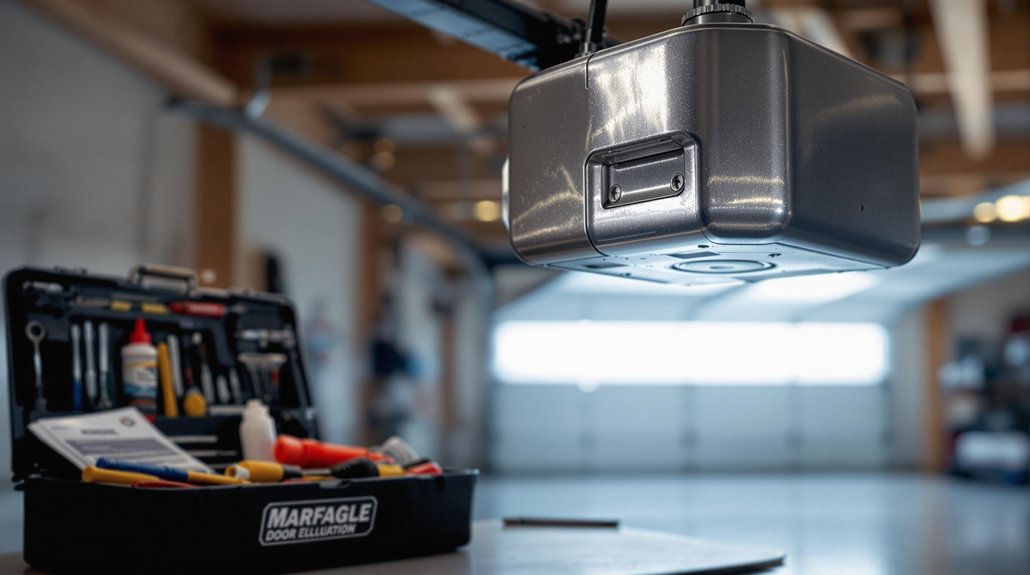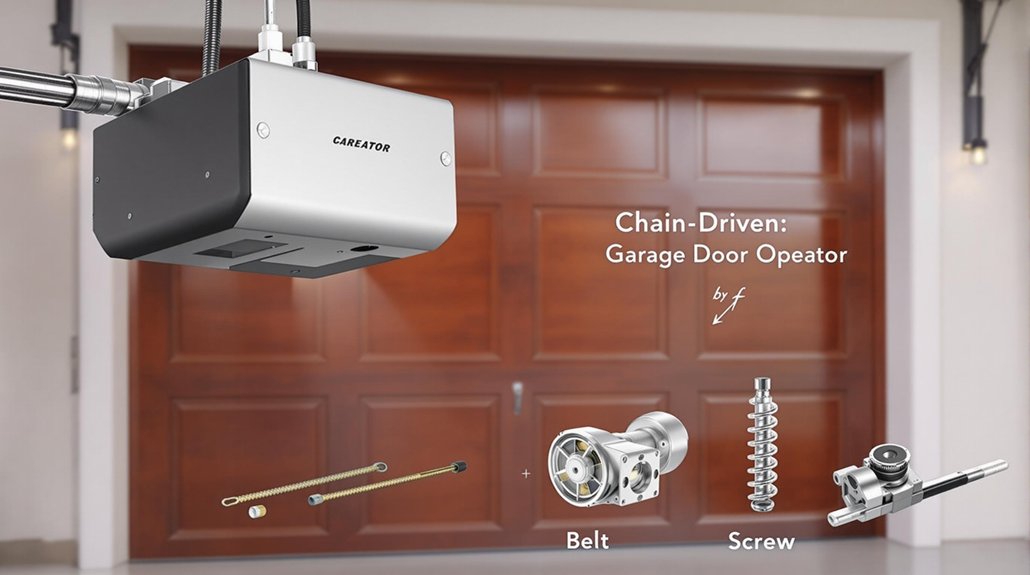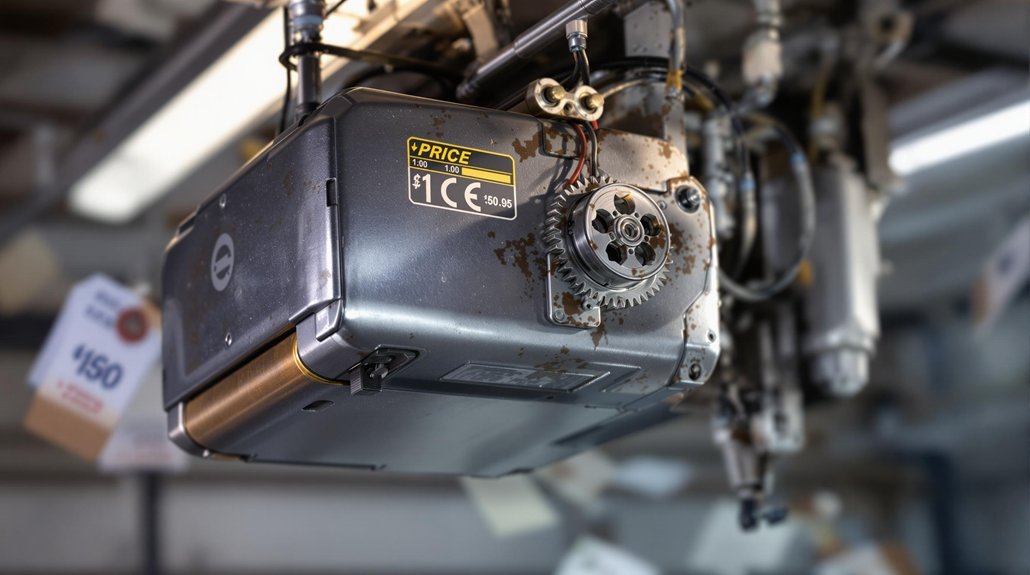Garage door operators usually last between 10 to 15 years. This lifespan varies based on the quality of the unit, how often it is used, and how well it is maintained. High-quality materials and proper installation can extend longevity. Regular checks and maintenance, such as lubrication and cleaning, help prevent issues. Signs that indicate wear include unusual noises, slow operation, and visible rust. If your operator shows these signs or frequently malfunctions, it may be time to contemplate a replacement. There are many operator types and features to choose from, which can provide additional options for your needs.
Key Article Highlights
- Garage door operators typically have a lifespan ranging from 10 to 15 years, depending on usage and unit quality.
- Operators nearing their lifespan may require replacement due to potential performance decline and safety issues.
- Factors such as material quality, installation practices, and environmental conditions significantly affect the longevity of operators.
- Regular maintenance, including lubrication and inspections, can help extend the lifespan of garage door operators.
- Smart technology and high-quality operators may offer improved durability and longer service life compared to standard models.
Average Lifespan of Operators
The average lifespan of a garage door operator typically ranges from 10 to 15 years. This duration can vary based on several factors, including the quality of the unit and the frequency of use. Different operator brands offer various features and durability levels, which can affect their longevity.
In recent years, technology advancements have played a significant role in the development of garage door operators. Modern operators often include smart features, such as remote access and automated settings, which enhance convenience but may also introduce complexities. These innovations can improve user experience but might also require more maintenance over time.
Additionally, higher-end operator brands tend to use better materials and engineering, leading to a longer lifespan. When selecting a garage door operator, it is essential to take into account both the brand reputation and the technology used in the device. Investing in a reliable operator with proven longevity can save homeowners both time and money in the long run. Regular maintenance and understanding the lifespan expectations of your specific model can further contribute to ideal performance and longevity.
Factors Affecting Longevity
Several factors can influence the longevity of garage door operators. Understanding these elements can help homeowners make informed decisions about their garage systems.
- Material Quality: The quality of materials used in the construction of the garage door operator plays a significant role. High-quality components are less prone to wear and tear, leading to a longer lifespan.
- Installation Practices: Proper installation is essential for the effective functioning of garage door operators. If installed incorrectly, operators may experience undue stress, resulting in premature failure. Hiring a professional with experience can guarantee that the installation meets industry standards.
- Usage Frequency: The frequency of use also impacts longevity. Operators that are used multiple times a day will generally wear out faster than those used less frequently.
Maintenance Tips for Durability

Regular maintenance can greatly extend the life of garage door operators. By implementing simple preventive measures, homeowners can guarantee that their garage door systems remain functional and efficient. One key aspect of maintenance is regular inspections. Check for loose screws, worn-out cables, and misaligned tracks. Addressing these issues promptly can prevent further damage.
Another important component is lubrication techniques. Applying a suitable lubricant to moving parts, such as hinges, rollers, and tracks, can reduce friction and wear. It is advisable to use a silicone-based lubricant, as it can withstand various weather conditions without attracting dirt. Lubrication should be performed every six months or as needed to maintain smooth operation.
Additionally, keep the garage door clean. Dirt and debris can accumulate on the tracks and mechanisms, which may hinder performance. Wipe down surfaces and remove any obstructions to guarantee peak function.
Lastly, testing the safety features regularly is essential. This includes checking the auto-reverse function and verifying that sensors are clear. By following these maintenance tips, homeowners can enhance the durability of their garage door operators and reduce the risk of unexpected failures.
Signs of Wear and Tear
Garage door operators can show signs of wear and tear over time. Common issues include noisy operation, slow response times, and visible rust damage. Recognizing these signs early can help prevent further problems and extend the life of your garage door system.
Noisy Operation Issues
A common sign of wear and tear in garage door operators is noisy operation. When you notice unusual sounds, it may indicate issues with the components. Noisy mechanisms can lead to vibration issues that not only disrupt the peace but may also signal the need for maintenance or replacement parts.
Here are three common causes of noisy operation:
- Worn-out rollers: Over time, rollers can wear down, leading to rough movements and increased noise during operation.
- Loose hardware: Bolts and screws can become loose, causing rattling sounds as the door operates. Tightening these can often resolve the issue.
- Lack of lubrication: Without proper lubrication, parts such as hinges and tracks can create friction, resulting in loud noises. Regular maintenance can prevent this.
Addressing these issues promptly can prolong the life of your garage door operator and enhance its performance. If noises persist, it may be time to consult a professional to guarantee safe and quiet operation. Recognizing these signs early is essential for maintaining peak functionality in your garage door system.
Slow Response Times
Experiencing slow response times from your garage door operator is a significant indicator of wear and tear. When you press the remote button or wall switch, you expect a quick reaction from the system. If the operator takes longer than usual to respond, it may be a sign of declining operator performance.
Several factors can contribute to slow response times. First, the motor may be wearing out, leading to reduced efficiency. Additionally, the sensors could be misaligned or damaged, causing delays in the door's operation. It is also possible that the opener's internal components are experiencing fatigue, affecting their ability to function properly.
Ignoring slow response times can lead to more serious problems down the line. Consequently, it is vital to address this issue promptly. Regular maintenance can help guarantee that all parts are functioning at their best. If you notice a consistent delay, consider consulting a professional technician. They can assess the situation and recommend necessary repairs or replacements. Monitoring response time is essential for maintaining a reliable garage door operator and guaranteeing safe operation for you and your family.
Visible Rust Damage
Visible rust damage is a clear indicator of wear and tear on your garage door operator. When you notice rust, it is essential to address it promptly to prevent further deterioration. Rust not only affects the appearance of your garage door operator but can also compromise its functionality.
To effectively manage visible rust damage, consider the following steps:
- Inspect Regularly: Conduct regular inspections of your garage door operator to identify any signs of rust early. This proactive approach aids in maintaining its longevity.
- Apply Rust Prevention: Utilize rust prevention methods, such as protective coatings or paints, to shield the metal from moisture and elements that cause corrosion.
- Implement Corrosion Treatment: If rust is present, apply appropriate corrosion treatment products to remove rust and restore the metal's integrity. This may include sandpapering the rusted areas and applying a rust neutralizer.
Types of Garage Door Operators

Garage door operators come in several types, each designed to meet specific needs and preferences. The most common types are chain drive, belt drive, and screw drive operators. Chain drive operators are known for their durability and are often used in heavy-duty models suitable for commercial use. Belt drive operators, on the other hand, offer quieter operation and are preferable for residential use. Screw drive operators use a threaded steel rod and are low-maintenance, making them a practical choice for many homeowners.
Wall mounted operators are another option, providing a space-saving solution for garages with limited ceiling height. Smart operators incorporate advanced technology, allowing users to control their garage doors remotely via smartphones. Battery backup systems are available to guarantee functionality during power outages, adding an extra layer of convenience and safety.
For those looking for flexibility, lightweight options are available that still deliver reliable performance. Choosing the right type of garage door operator depends on your specific needs, whether for residential or commercial applications. Understanding these types can help you make an informed decision when selecting an operator that best fits your lifestyle.
When to Consider Replacement
Knowing when to replace your garage door operator is important for safety and convenience. Consider the age of the operator; if it is nearing or past its expected lifespan, replacement may be necessary. Additionally, frequent malfunctions can indicate that it is time for a new unit to guarantee reliable operation.
Age of Operator
When evaluating the lifespan of a garage door operator, it's important to look closely at its age. The age of an operator is a key factor in determining whether it needs replacement. Typically, a garage door operator can last anywhere from 10 to 15 years, depending on the operator technology and usage. As operators age, their performance may decline, leading to potential safety issues and inconvenience.
Here are three signs that indicate it may be time to think about replacing your garage door operator:
- Age: If your operator is nearing or has exceeded its expected lifespan, it may be time to think about a replacement.
- Lack of Features: Older operators may lack modern safety and convenience features that are now standard in newer models.
- Compatibility: Newer garage door systems may require updated operator technology for ideal performance and safety.
Monitoring the age of your operator is essential for maintaining efficiency and safety. When it comes to ensuring a smooth operation, proactive replacement can prevent future complications and enhance your overall experience.
Frequent Malfunctions
Frequent malfunctions in a garage door operator can signal the need for replacement sooner rather than later. If your garage door frequently fails to open or close, you may be facing underlying issues that require attention. Common causes of these malfunctions include worn-out gears, faulty sensors, or issues with the remote control.
Before deciding to replace the operator, think about some troubleshooting tips. First, check the power source to confirm the unit is receiving electricity. Next, inspect the sensors for dirt or obstructions that may prevent proper function. Additionally, listen for unusual noises during operation, as these can indicate mechanical problems.
If you have tried troubleshooting without success, it may be time to reflect on a replacement. Frequent issues can lead to increased repair costs and inconvenience. A new garage door operator can provide improved reliability and performance. Generally, if repairs exceed half the cost of a new unit, replacement is the better option. By recognizing the signs of frequent malfunctions and understanding their common causes, you can make an informed decision about whether to repair or replace your garage door operator.
Cost of Replacement Options

Replacing a garage door operator can vary considerably in cost, depending on several factors. Homeowners should consider various elements when seeking replacement estimates. A cost comparison can help identify the best option for your budget.
- Type of Operator: Different models, such as chain drive, belt drive, or screw drive, come with varying price tags. Generally, belt drives are more expensive but quieter.
- Installation Costs: Professional installation fees can range widely. DIY installation may save money but requires skill and time.
- Additional Features: Modern operators often include smart technology and safety features. These upgrades can increase the total cost but may offer long-term savings.
Frequently Asked Questions
Can Weather Conditions Impact Garage Door Operator Lifespan?
Weather conditions act like a sculptor, shaping the lifespan of garage door operators. Temperature extremes and humidity levels can accelerate wear, leading to mechanical strain and reduced efficiency, ultimately impacting their longevity and functionality.
Do Garage Door Operators Require Professional Installation?
Garage door operators often benefit from professional installation due to the complexity involved. Utilizing professional expertise guarantees proper function, safety, and longevity, minimizing future issues and enhancing overall performance. This is particularly vital for peak operation.
Are There Any Warranties for Garage Door Operators?
Yes, many garage door operators come with warranty coverage, varying by manufacturer. It is crucial to follow maintenance tips to guarantee longevity, as proper care may prevent potential issues and uphold warranty conditions effectively.
How Can I Improve the Lifespan of My Garage Door Operator?
To enhance the endurance of your garage door operator, prioritize routine maintenance and proper lubrication. Consistent care guarantees smooth operation and minimizes wear, ultimately extending the lifespan and functionality of your essential home equipment.
What Brands Are Known for Durable Garage Door Operators?
Several brands are recognized for durable garage door operators, particularly LiftMaster, praised in numerous reviews for reliability, and Genie, known for its innovative features. Both brands offer options that enhance longevity and performance in garage door systems.